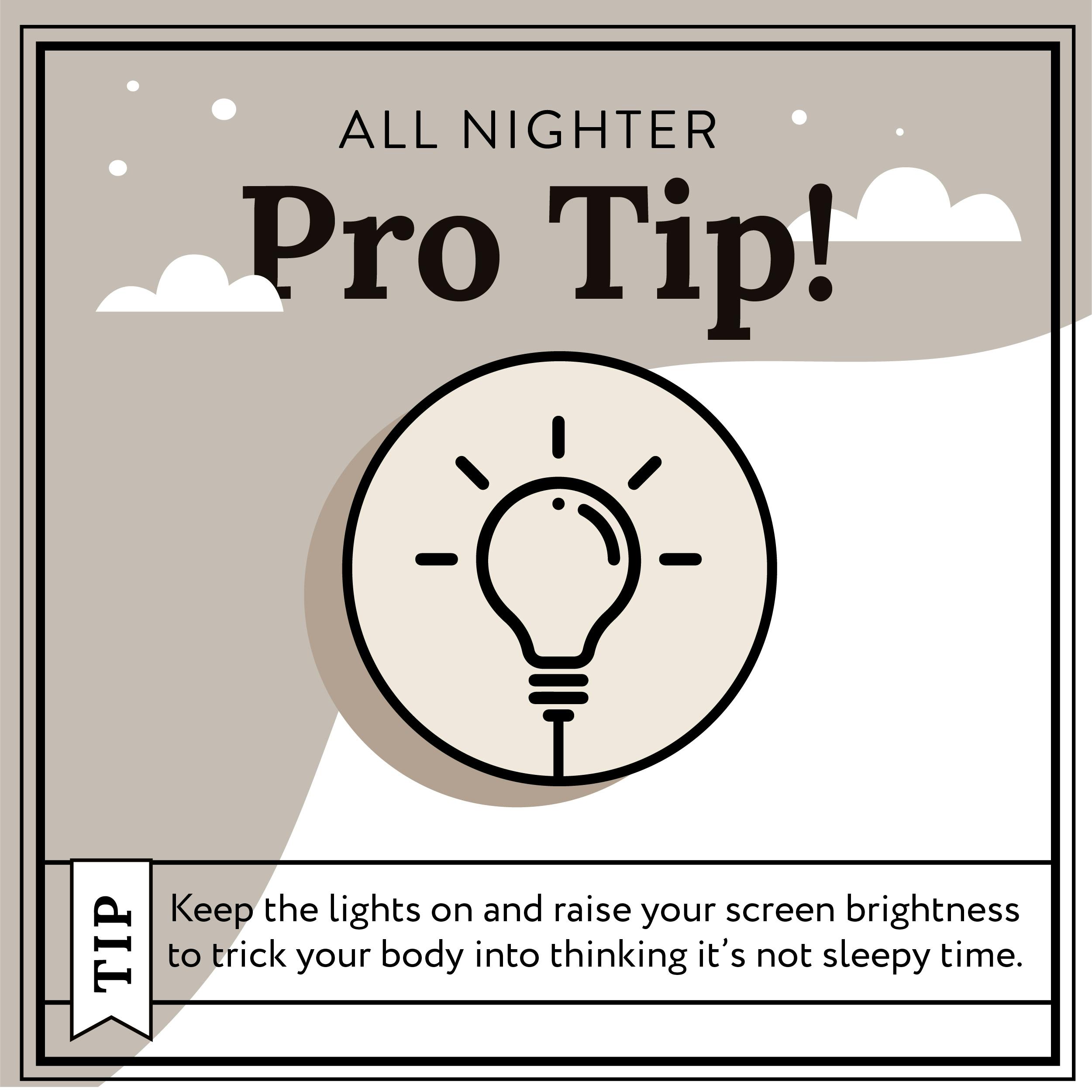As a college student, I’ve pulled my fair share of all-nighters. Whether I needed to study for an upcoming exam or meet a next-day deadline, these situations unintentionally (but unsurprisingly) always led to staying up all night. I can’t lie and say the outcomes weren’t worth the lack of sleep—because getting an A on that research paper definitely validated my decision.
Good grades aside, the few days it’d take my fried brain and drained body to recover did have me questioning if I’d ever stay awake all night again. (The answer, by the way, was yes, I would.)
We’ve written about why you shouldn’t pull an all-nighter, but even when all the facts point to the same conclusion—that it can be bad for your health—staying awake all night is sometimes inevitable.
So, we put together this guide on how to survive a night of no sleep without sacrificing your health too much. Below, learn more about preparing your body to stay awake, how to effectively pull an all-nighter, and recovering the next day.

How to prepare for staying awake all night
An essential step in pulling an all-nighter is the prep. How you start your day and what you do throughout it will affect the way your body reacts to staying up all night.
Follow these tips to better prepare your body for a night of no sleep:
Get a good night’s sleep the night(s) before
Waking up feeling energized begins with getting enough sleep the night before pulling an all-nighter. But if you’re like me and think five or six hours is enough, apparently we college kids got it all wrong.
According to the Centers for Disease Control and Prevention, adults between the ages of 18 and 60 years old need approximately seven to eight hours of sleep for good health and wellbeing; anything less can cause sleep deprivation and a higher chance of crashing during that midnight work session.
If you still wake up feeling tired after a full night’s sleep, consider power napping. Napping helps reduce sleepiness, improve learning and memory formation, and regulate emotions. The National Sleep Foundation recommends napping for 10 to 20 minutes to feel refreshed and to prevent grogginess or drowsiness caused by oversleeping.
Check out our sleep tips for college students to help establish a sleep routine that works for you.
Avoid intense physical exertion
It’s a no-brainer that after you work out, you’re physically worn out—and all you crave is a nice shower and your comfy bed. For this reason, avoid intense physical activity when you plan on pulling an all-nighter to preserve your energy.
That way, your energy is allocated toward mental exertion for when you’re learning, reviewing, memorizing, and applying information throughout the night.
How to pull an all-nighter
Now that we’ve shared a few tips on how to prep for a night of zero shut-eye, it’s time for the real thing. Here are five tips to help you stay awake and work efficiently when pulling an all-nighter:
1. Stay out of your bedroom
Like me, many of you will work from your bedroom when you stay up all night. Success rate? Not so great—but what can you expect when you study in the very space you use to go to sleep?
Once I realized my student apartment wasn’t cutting it, during finals season you’d find me camping out at the school library all night instead. And no, I wasn’t the only one.
Leave your room and go work in the kitchen, the living room, or even the restroom if you have to. Almost any setting would make for a better study or work spot than your bed.
2. Keep it lit
It’s a proven fact that light—whether from a natural or artificial source—keeps you awake. Here’s why: We all possess a circadian rhythm, an internal clock that controls our natural sleep. In the dark, your body produces melatonin to help prepare you for sleep, while in the light, your body halts melatonin production so you remain alert.
If you want to stay awake all night, then turn on all the lights and raise your screen brightness to trick your body into thinking it’s not sleepy time.

3. Turn up the heat
A cold room and a soft blanket are my sleep heaven—my weakness, I should say. But like darkness, cooler temperatures also encourage drowsiness and tiredness.
Raising the temperature so it’s warmer will help you stay alert. So if you still find yourself dozing off, then go ahead and make your room hotter. This should help prevent you from falling asleep at your desk.
4. Put down the sugar and pick up the protein
A “sugar high” is not the move if you plan to stay up all night. Sugary foods heighten your energy levels, which is great for when you want to increase your work efficiency. Remember, though, that what goes up, must come down.
Sugar is a carb, and carbohydrates increase tryptophan and serotonin levels, causing a sudden dip in energy called a “sugar crash.”
Instead of devouring a bunch of sweets, opt for foods that are high in protein. “Sugar is short-lived; protein makes you more sustained,” says Benjamin Caplan, MD, family physician at CED Clinic in Chestnut, Mass.
According to Caplan, foods high in protein will not only boost your energy levels but also keep them from dipping longer. These foods increase mental alertness and wakefulness, which is great for when you’re hitting the books or working on a project in the A.M.
oods high in protein include:
- Peanut butter
- Cottage cheese
- Egg whites
- Tuna
- Lentils
- Quinoa
- Beans
- Raw and unsalted nuts
It’s also important to note that eating large meals can make you feel tired, so snacking and small portions are the key to not falling into a food coma!
5. Take activity breaks
I admit it: I’d rather finish my work and sleep as soon as possible than interrupt my studying with a break. This, however, is counterproductive because it overworks my brain, decreases my alertness, and breaks my focus—thus making me more distracted.
I’ve learned the value of doing small activities that get me moving and feeling refreshed but won’t exhaust me. Walking outside for 10 minutes helps me retain information better, gives my eyes a break from my screen, and helps me maintain focus. Other activities you can do include jumping jacks, stretching, dancing, and even taking a quick shower with cold water.
Bonus tip: Try a coffee power nap
This tip right here is what all my coffee-lovers have been waiting for. It’s no secret that coffee boosts alertness because it contains caffeine. The thing is, timing plays a big role in how effective coffee will be at helping you maintain energy.
The best way to use coffee to your advantage during an all-nighter is by taking a coffee power nap, explains Matthew Paxton, founder of the gaming website Hypernia, who’s pulled plenty of all-nighters himself. Paxton says he drinks a coffee right before he takes his 20-minute power nap when prepping for a long night’s work session.
This helps boost his energy levels. That’s because taking a nap enhances the brain’s capacity to receive caffeine, increasing the body’s wakefulness. Although Paxton chooses to take his coffee power nap before his work session, you could also do it when you begin to feel tired during the night.

How to recover from an all-nighter
At this point in the process, you know how to successfully stay up all night. What comes next? Making sure it doesn’t totally wreck your health.
Here’s how to recover the following day:
Take a short nap
As much as you’d love to “catch up on sleep” the following day, avoid long naps at all costs if you think you’re going to get a full night’s sleep the next night. Take a shorter nap—less than 30 minutes—instead.
This will help give you enough energy to survive the day and make it to nighttime. It will also ensure you’re able to train your body to sleep at its usual time again.
Do some yoga
Just like you shouldn’t do intense exercise the day before pulling an all-nighter, it’s also best to avoid it the day after as well. Because your body is trying to recover from lack of sleep, skip working out for your safety.
Instead, consider doing yoga to relax your tired brain and tense body. Yoga before bed can help alleviate muscle tension, promote relaxation, and prepare your body for deep sleep. Treat your body to these yoga poses to help you get a good night’s rest.
FAQs
Does caffeine keep you awake?
Caffeine is a stimulant that boosts alertness in some people. The Food and Drug Administration recommends no more than 400 milligrams of caffeine a day. (The average cup of coffee, FYI, has around 96 milligrams of caffeine, according to the Mayo Clinic.)
Keep in mind that for some people, caffeine can cause unwanted feelings of jitteriness and anxiety. If you’d like to learn more about how caffeine affects your body at night, here are all the ways it can disrupt your sleep.
How can I stay awake for 24 hours without caffeine?
If you plan on pulling an all-nighter, sleep approximately seven to eight hours the night(s) before to ensure your body is well-rested. You can also eat foods high in protein as they will help you stay awake longer.
What foods make you stay awake?
Foods with high levels of protein make you stay awake as they increase mental alertness and wakefulness. These include peanut butter, egg whites, beans, and quinoa.
How can I force myself to stay awake? How do I survive an all-nighter?
Though it’s not recommended you force yourself to stay awake, if you must, consider altering the environment in which you’re working. Bright lights and warm temperatures can help prevent your body from feeling drowsy and tired. The next day, avoid taking a long nap so you can fall asleep at your normal bedtime.
Is it OK to pull an all-nighter once?
It’s OK to pull an all-nighter once, as long as you do your best to take care of yourself the following day. Otherwise, consistent all-nighters can harm cognitive function, affect your emotions, increase appetite (which can lead to unwanted weight can), and result in a never-ending bad sleep schedule.
How can I stay awake at work?
If you find yourself feeling tired and sleepy at work, make sure to eat a protein-packed breakfast, lunch, or snacks, stay in a well-lit work environment, and take activity breaks to help you stay awake.
How can I stay awake in class?
For those days you feel sleepy at school because you pulled an all-nighter or slept late the night before, eat protein-packed snacks and take activity breaks to get you through the day.
The bottom line on pulling an all-nighter
Staying up all night should be your last resort. If you fall into the vicious cycle of consistently staying up to knock out work, then you’ll likely find yourself struggling to sleep on nights when you don’t have any assignments to complete.
The best advice for preventing multiple all-nighters is to manage your time, stop procrastinating (speaking from experience, I know this is easier said than done!), and most importantly, to make the most of your daytime hours so you don’t feel pressured to stay awake all night.
Do you find yourself pulling all-nighters regularly? Take our sleep deprivation quiz to find out if your sleep habits are harming your health—and what you can do to get better rest.




